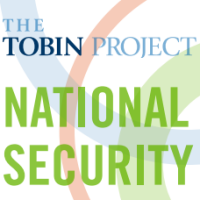Sustainable Security Events in Washington, D.C.

In January, scholars from the Tobin Project's National Security initiative discussed their recent work on sustainable national security at the Brookings Institution's Project on International Order and Strategy and the American University School of International Service’s Bridging the Gap project.
Jeremi Suri, Daniel Drezner, Nancy Hite, and Jonathan Kirshner presented research relating to the question: "How can the US preserve its economic strength in a way that advances its long-term security?" Their papers take on three different aspects of the question using three different research methods.
Suri argues that state financial capacity – not, as some would claim, sheer military strength or cultural “soft power” – is the key to state power. Using historical evidence from 19th-century Britain and China, he shows that successful states are those that develop the political and economic institutions necessary to raise large amounts of cheap capital and then use that capital to adapt to global challenges and remain active in world affairs.
Kirshner confronts the effects of the recent financial crisis using the tools of international political economy. He argues that the recent crisis – which, unlike earlier crises, had its roots in the United States – has increased the vulnerability of the dollar to competing global reserve currencies and may reshape the world’s dollar-friendly monetary and financial system to provide less power and privilege to the U.S.
Finally, Drezner and Hite examine the argument that military primacy produces significant economic benefits for the United States – one that backers of large defense budgets and aggressive military postures often make – and find it wanting. Military primacy is not economically worthless, they write, but its marginal benefits may be far smaller than advocates of primacy claim, especially in today’s unipolar world.
Jeremy Shapiro, formerly of the State Department, led the discussion at Brookings with policymakers that included representatives from the Department of Defense and USAID, along with think tank fellows from the Cato Institute, Center for a New American Society, and others. Gordon Adams and James Goldgeier of American University's School of International Service helped shape a productive debate among fellow scholars from American University, Georgetown, MIT, and beyond. Attendees were eager to discuss new perspectives and strategies for national security in a post-financial crisis world.

